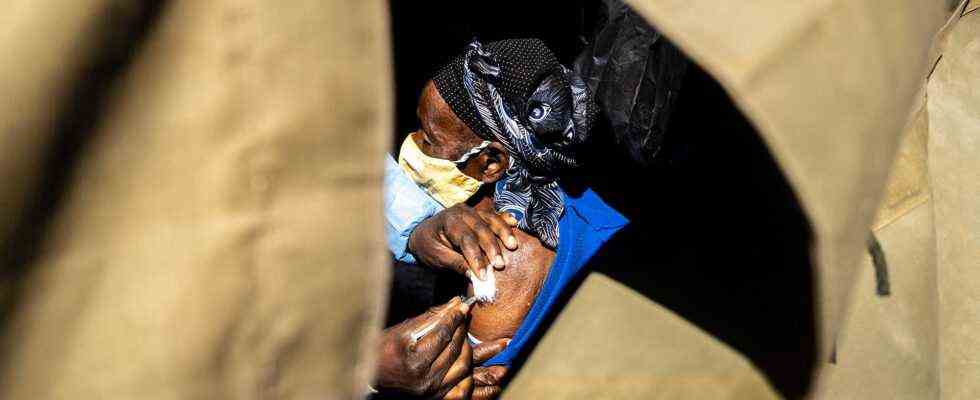Status: 06.09.2021 5:00 p.m.
Only three percent of the population of Africa are fully immunized. And there is still far too little vaccine available, despite many promises. Countries are now calling for vaccine justice.
Today they are not standing in vain in front of the hospital: there is vaccine in Nairobi, Kenya’s capital. A donation of Moderna vaccines from the USA has reached the East African country, AstraZeneca is also available. “People lose loved ones, so it’s important to get vaccinated,” says Pamela Lovega. She also wants to persuade her neighbors to come here.
Vaccination goal is missed
But it is not a matter of course that there are opportunities to get vaccinated. Again and again in the past few months no vaccine was available. Kenya is not only relying on the continent’s joint efforts, but is also trying to organize vaccination doses bilaterally.
At least ten percent of Africa’s population should be fully immunized by the end of September, but the World Health Organization (WHO) has to say goodbye to this goal. “If it continues like this, I fear that 42 African countries will not achieve this goal – that would be almost 80 percent of the continent,” explains Matshidiso Moeti, WHO regional director.
Only three percent immunized
In Africa, across the continent, less than three percent of the population is currently fully immunized. According to the commission, it is 70 percent of the adult population in the EU. “It’s a vaccine apartheid,” says Ahmed Kalebi, medical advisor and pathologist. He is expressing what many are thinking here. “It is a worldwide discrimination in which some countries have everything. There up to 65 percent are vaccinated and they have enough supplies. Two to three times more than their population.”
Africa is heavily dependent on vaccine donations through the so-called Covax initiative. It is a buying community with the idea that rich countries pay for the vaccine of poorer ones. It should be distributed more fairly from the start. Covax has pledged to deliver vaccine to 30 percent of Africa’s population by September 2022, according to the African Union. The African Union is also buying a further 400 million cans of Johnson & Johnson for the continent. Even if everything is delivered and everything goes as planned, the people on the continent will not be as far along as Germany and other rich countries are today for a year.
EU donates 200 million cans
The European Union recently pledged 200 million doses by December. “We should see a dramatic change in delivery,” said Strive Masiyiwa, African Union special envoy for Covid-19. “Is it enough? No, it’s not. We still need a lot more vaccine.” And then the successful businessman becomes very clear: “I have hopefully put adequate pressure on Covax and asked them to keep their promises.”
The rich should share directly with the poor, it didn’t work. “They vaccinate a third dose while others have too little,” says Kalebi. “That is not fair, and not only from a moral and ethical perspective. If you look at it scientifically, that makes no sense either. In countries where there is no vaccination, there is a risk that variants will develop. The virus can then spread back to where the immunization was already taking place. Then it was all pointless and pointless. “
Corona numbers in Kenya
Kenya With a population of around 53 million, it has registered 240,000 infections with the coronavirus and around 4,700 deaths since the beginning of the pandemic. Currently, the seven-day incidence is nine. Even if the number of unreported cases is likely to be high, the situation in other African countries, such as Nigeria, is comparable.
In comparison, for example Italy with around 59 million inhabitants since the beginning of the pandemic, 4.5 million infections and 130,000 deaths have been counted. Currently, the seven-day incidence is 68.
(Source: Reuters Covid-19-Tracker, worldometers)
Vaccines expire or cannot be distributed
Despite the high demand, there are unused vaccine doses on the continent that cannot be used or that are destroyed. There are several reasons for that. In some cases, the donated vaccine expired quickly. Normally, AstraZeneca can be kept in the refrigerator for around six months, for example, with only significantly less time left, the countries could no longer distribute it quickly enough.
Other countries were not yet sufficiently prepared for the distribution, both financially and in terms of their infrastructure. That is probably the lesson for poor countries, says Kalebi. “They have to prioritize health and improve their infrastructure and technology. Most of these countries cannot produce their own vaccines, not even for other infectious diseases. That is a problem.”
Goals are probably not being achieved
In Rome, the G20 health ministers are currently talking about corona and future pandemics. Germany announced the donation of further vaccination doses. “It’s not really a problem of too little money, if you are honest. There are enough individual initiatives. I think it is the rich countries that are selfish,” says Kalebi. “The African Union can do very little if the big countries don’t wake up.”
Because even the targeted 60 percent immunization by next September will not be enough, we already know that. “If you look at the USA and Israel, you see that that might not be enough,” says Masiyiwa. “The WHO is already pushing us to target 70 percent.” Then Africa needs more vaccine.

